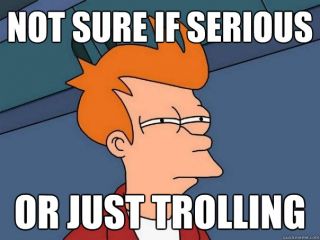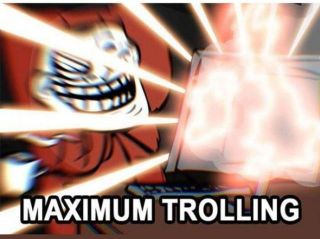Trolling is an online phenomenon that people may witness without necessarily knowing what it is. The term 'troll' appears to have originated from a method of fishing, where one would fish by trailing a baited line behind a boat. However, many internet users often use the description of being a troll as a mythological creature that hides under bridges, waiting for an opportunity to pounce. With the latter definition, one can see the comparison with the modern day world with hiding under bridges being the online world waiting for an opportunity that may warrant a troll to take action. With the first definition, it is clear that casting a baited line as a form of provoking individuals into some form of emotional response.

Trolling appears to be a variably defined concept, with multiple definitions existing. It appears to have been first reported in 1999 by Dr. Judith Donath who argued that “trolling is a game about identity deception”, which suggests that a troll's personal opinion is often avoided during the act. According to Dr Susan Herring and her colleagues, trolling comprises “luring others into often pointless and time-consuming discussions”. In a 2010 paper, Lochlan Morrissey expanded this even further by saying “trolling is an utterer producing an intentionally false or incorrect utterance with high order intention [the plan] to elicit from recipient a particular response, generally negative or violent”. Thus, it appears trolling is an act of intentionally provoking and/or antagonising users in an online environment that creates an often desirable, sometimes predictable, outcome for the troll. Morrissey also states that trolling is a complex intentional act, that some may consider an art. On the other hand, others have included trolling as a form of cyberbullying.
To date, there has been very little empirical research into online trolling, with only two key studies being documented before we carried out our own research (but more of that later). The first of these was published by Dr. Pnina Shachaf and Dr. Norika Hara in the Journal of Information Science, and examined trolling in the context of Wikipedia. The second study by Susan Herring and her colleagues focused on trolling in feminist forums. Despite the lack of research, some key findings have emerged. Firstly, Herring’s study identified three types of messages sent by trolls. These were (i) messages from a sender who appears outwardly sincere, (ii) messages designed to attract predictable responses or flames, and (iii) messages that waste a group’s time by provoking futile argument. From this, it is apparent that trolling often merges with several other online behaviours. They pointed out that a troll is an online user that can be uncooperative, that seeks to confuse and deceive and can be a flamer by using insults.
Shachaf and Hara's study on trolling within Wikipedia revealed that the main reasons for trolling were boredom, attention seeking, and revenge. Furthermore, they regarded Wikipedia as an entertainment venue, and found pleasure from causing damage to it and the people who used the site. Herring’s paper argued that it is non-mainstream environments that are especially vulnerable (such as forums) as they “provide a new arena for the enactment of power inequities such as those motivated by sexism, racism, and heterosexism”. Due to this, one could suggest that trolling is a behaviour that is facilitated and possibly exacerbated by the anonymity of the internet.

Many authors have argued that relative anonymity facilitates disinhibition, resulting in flaming and harassment. This online disinhibition effect is well established in the literature (particularly in a 2004 paper in the journal CyberPsychology and Behavior by Dr. John Suler). As a 2011 paper on internet addiction in the International Journal of Cyber Behavior, Psychology and Learning by Dr. Laura Widyanto myself noted, the internet “might lead to disinhibition, whereby individuals feel more confident as they are protected by their anonymity”. Therefore, internet users have an opportunity to present themselves differently online. From this, the opportunity for trolling is undeniably present as Widyanto and myself make clear, “the internet provides anonymity, which removes the threat of confrontation, rejection and other consequences of behaviour”. This allows individuals to behave online in ways that they would not normally do in the offline world.
Research suggests that anonymity, which is naturally characterised by the internet, may affect a person's self-esteem. Self-esteem has been consistently associated as an important determinant of adolescent mental health with lower self-esteem being linked to depression and increased levels of anxiety. Therefore, it has been claimed that high self-esteem is psychologically healthy. However, online interactions allow an individual to represent a different self, leading to increased feelings of self-worth and therefore be more psychologically healthy.
However, research into online trolling had not established any association between the effects of trolling and self-esteem, and was one of the main reasons we carried out our own research into the topic. There is quite a lot of research into self-esteem and more general internet use. For instance, research indicates that individuals with low self-esteem prefer to communicate with others through the internet, such as emails, rather than face-to-face. It has also been found that general internet use increases self-esteem, and some research has indicated that video game use decreases self-esteem. This suggests that the internet can be used as a form of social interaction that positively affects self-esteem for those with considerably low self-esteem. However, given the evolution of online gaming in recent years, the effect of self-esteem while playing online video games where social interaction (including trolling) can occur is relatively unknown.
Until recently, trolling had never been studied in an online video game context and there is still little empirically known about it in the most general sense of the term. Trolling often merges other online behaviours such as flaming. Dr. Angela Adrian (in a 2010 issue of Computer Law and Security Review) offers limited, albeit useful, insight into how an individual may troll during online gaming. Adrian names those who enact such behaviour as “griefers”, a term used on those who try to ruin a gaming experience, often by team-killing or obstructing objectives. It could be that griefing is one such behaviour used during trolling in the context of an online video game. Furthermore, given the evolution of online gaming, it is possible that the behaviour of trolling has evolved to fit into the context in which the trolling is being used in (e.g., online forums, Wikipedia, video games), and therefore, contains many other online behaviours that are used to disrupt others’ gaming enjoyment.

Given the little psychological research that had been conducted beyond the fact that it exists, Scott Thacker and myself carried out a study to examine the (i) frequency of trolling, (ii) type and reasons for trolling and (iii) the effects trolling may have on self-esteem (and published in a 2012 issue of the International Journal of Cyber Behavior, Psychology and Learning). Using an online survey, a self-selected sample of 125 gamers participated in our study. Our results showed that trolls tended to play longer gaming sessions. Frequent trolls were significantly younger and male. Types of trolling included griefing, sexism/racism, and faking/intentional fallacy. Reasons for trolling included amusement, boredom, and revenge. Witnessing trolling was positively associated with self-esteem, whereas experiencing trolling was negatively associated. Experience of trolling was positively correlated with frequency of trolling. Although the study used a self-selecting sample, the results appear to provide a tentative benchmark into video game trolling and its potential effects on self-esteem.
Our study has many limitations that need to be taken into account. Firstly, due to the nature of questionnaire design and it being self-report, it may be open to social desirability effects (i.e., participants may answer differently to represent a different self) and any of the other known problems with self-report methods (e.g., unreliable memory and recall biases, etc.). Another major limitation was that the sample was self-selecting and modest in size. This raises questions into its relative generalizability. Despite these limitations, our exploratory study appears to provide several key findings that now provide a preliminary benchmark into video game trolling where there was no previous research. Moreover, it expands the neglected research into online trolling and offers areas and directions for future research.
References and further reading
Adrian, A. (2010). Beyond griefing: Virtual crime. Computer Law and Security Review, 26, 640-648.
Donath, J. S. (1999). Identity and deception in the virtual community. In M. A. Smith and P. Kollock (Eds.), Communities in cyberspace (pp. 29–59). London: Routledge.
Herring, S., Job-Sluder, K., Scheckler, R. & Barab, S. (2002). Searching for safety online: Managing “Trolling” in a feminist forum. The Information Society, 18, 371-384.
Morrissey, L. (2010). Trolling is a art: Towards a schematic classification of intention in internet trolling. Griffith Working Papers in Pragmatics and Intercultural Communications, 3(2), 75-82.
Shachaf, P. & Hara, N. (2010). Beyond vandalism: Wikipedia trolls. Journal of Information Science, 36(3), 357-370.
Suler, J. R. (2004). The online dishibition effect. CyberPsychology and Behaviour, 7, 321-326.
Thacker, S. & Griffiths, M.D. (2012). An exploratory study of trolling in online video gaming. International Journal of Cyber Behavior, Psychology and Learning, 2(4), 17-33.
Widyanto, L., & Griffiths, M. D. (2011). An empirical study of problematic internet use and self-esteem. International Journal of Cyber Behaviour, Psychology and Learning, 1(1), 13-24.
Willard, N. (2006). Cyberbullying and cyberthreats: responding to the challenge of online social cruelty, threats, and distress. Center for Safe and Responsible Internet Use.




